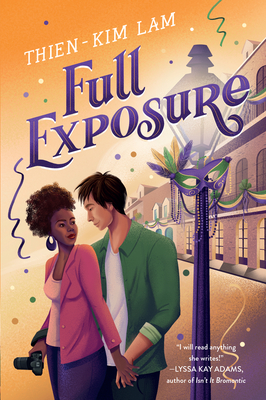 Full Exposure: A Novel by Thien-Kim Lam
Full Exposure: A Novel by Thien-Kim Lam Format: eARC
Source: supplied by publisher via Edelweiss
Formats available: paperback, ebook, audiobook
Genres: contemporary romance, romantic comedy
Pages: 320
Published by Avon US on February 21, 2023
Purchasing Info: Author's Website, Publisher's Website, Amazon, Barnes & Noble, Kobo, Bookshop.org, Better World Books
Goodreads
Happy Endings author Thien-Kim Lam is back--with a rom-com set during the divine madness of Mardi Gras as two lovers ask: Can a Big Easy fling become the real thing?
Boudoir photographer Josie Parks never ever takes a vacation. But when a client cancels a New Orleans shoot at the last minute, she decides to fly out from her Washington, D.C., studio anyway. Maybe the trip will reawaken her recently stagnant muse. After all, it's Mardi Gras season...
Spencer Pham has come home after twelve soul-sucking years in corporate hell to pursue his passion: making a docu-film on his family's history as the first Vietnamese Mardi Gras krewe. The last thing he expects is getting whacked in the head by a beautiful woman trying to snag some parade beads.
During a long night at urgent care, Spencer and Josie connect over their artistic pursuits. He offers to show her the real New Orleans, if she'll help him with the camerawork for his film. Despite Josie's type-A personality clashing with Spencer's laissez-faire attitude, they seem to make a great team, and soon, the good times are rolling both on and off camera. But Josie has a life in D.C., and they both have big dreams they're chasing. When this Big Easy fling starts feeling awfully serious, can they find a way to choose between personal and professional passion?
My Review:
Mardi Gras was just this past Tuesday, making this the perfect week for a visit to New Orleans – at least between the pages of this sparkling romance. There’s always magic in New Orleans, whether at Mardi Gras or not – even if it’s just the magic of the beignets at Café du Monde.
Although the description of the messy, yeasty, sugary goodness of the beignets on Josie and Spencer’s first date will certainly make every reader’s mouth water nearly as much as Josie’s when she first checks Spencer out.
Just after she hits him in the head with the parade beads she’s just caught. It’s either a painfully cute meet cute – or just downright painful. Because either Spencer is seeing stars and little birdies after Josie clocks him – or there are some serious sparks between them from the very beginning.
Jodie’s mortified – but not concussed – and she’s feeling them too. Definitely sparks.
Over a couple of plates of those iconically delicious beignets, Spencer and Josie discover that they have more than sparks and less than a whole lot of time to see where those sparks might lead.
Josie’s in town for a mere seven days before she needs to return to her successful but stressful boudoir photography business in Washington DC. Spencer is back home in New Orleans for an unspecified while, after a dozen years in a high powered, high stress and highly detested job in – of course – Washington DC.
Spencer is more than willing to go with the flow and see where it takes them. Josie has always been constitutionally incapable of taking a step without not just A plan, but Plans B through at least F or G as well. But just this once she’ll try.
For as long as she can stand it. Or until fate intervenes. Or love walks in. Or out. Or all of the above.
Escape Rating B+: The meet-painfully-cute kicks this one off with a bang – or at least with a clonk to the noggin. The banging comes later. But this isn’t just a romantic comedy, although it certainly has plenty of the elements to make it qualify as one.
(Which is honestly kind of a relief. I read several books last year that were promoted as romcoms that turned out to be anything but. So the truth in advertising is a welcome change.)
Howsomever, Full Exposure isn’t just a romcom and it’s the not-so-funny bits that tug at the heartstrings after the final page is turned.
A big part of what both Spencer and Josie are dealing with outside of all the sparkly banter between them are real cases of burnout. Both are/were under pressure in stressful jobs and both have issues with saying enough is enough. In Spencer’s case that’s a result of family pressure and a lack of open communication, while in Josie’s case it’s because she selflessly sacrificed both her savings and her dreams when her younger sister was in a severe accident and needed long-term, expensive, hospital care and physical therapy.
While the reasons for it may be different, both of them feel intensely responsible for supporting their birth families and neither of them are able to open a space in those feelings for their own artistic dreams – because art doesn’t make money they both believe their families still need.
As much as Josie and Spencer have their artistic dreams in common, their romance is definitely a case of opposites attracting. Josie is Type-A down to her toes, while Spencer has a bit more of the New Orleans attitude of “laissez les bons temps rouler” – or at least a bone deep ability to be spontaneous that Josie planned out of her own life in the wake of her sister’s accident.
But Spencer needs a bit of Josie’s organizational magic as much as she needs a touch of his spontaneity. (Not to mention as much of his touch pretty much everywhere as she can get!)
So this is a romance of letting go, letting things out, letting things unfold, and not giving up on the best thing that’s ever happened to either of them without one hell of a fight.
One of the other terrific things about this story is that, in spite of some bumps in the road, both Josie and Spencer are functional people who have terrific support networks behind them that they both truly appreciate.
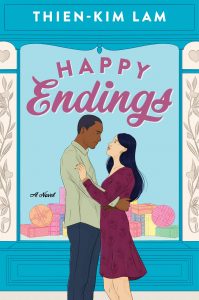 In Spencer’s case it’s his sometimes intrusive but always loving family and the New Orleans Vietnamese community of which they are an integral part. In Josie’s case it’s her best friends, the Boss Babes, who are with her through thick and thin and crisis and resolution and everything in between.
In Spencer’s case it’s his sometimes intrusive but always loving family and the New Orleans Vietnamese community of which they are an integral part. In Josie’s case it’s her best friends, the Boss Babes, who are with her through thick and thin and crisis and resolution and everything in between.
Josie’s Boss Babes are terrific, but it seemed terrifically obvious that we weren’t getting the whole picture of who they were and how they all fit together in this story. The Boss Babes, including Josie, first appeared in the author’s debut novel, Happy Endings. (In other words, while Full Exposure isn’t exactly the second book in a series it isn’t exactly not, either) So if you enjoy Josie and Spencer’s story, and I definitely did, and if you’re wishing for a gang like the Boss Babes of your very own, check out Happy Endings the next time you’re looking for a fun, sexy read with a whole lot of heart. I certainly plan to!

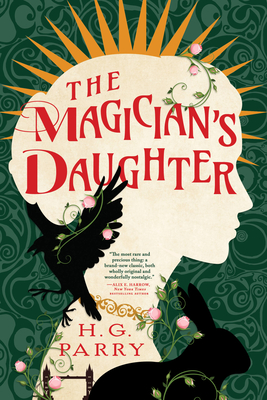 The Magician's Daughter by
The Magician's Daughter by  World Running Down by
World Running Down by 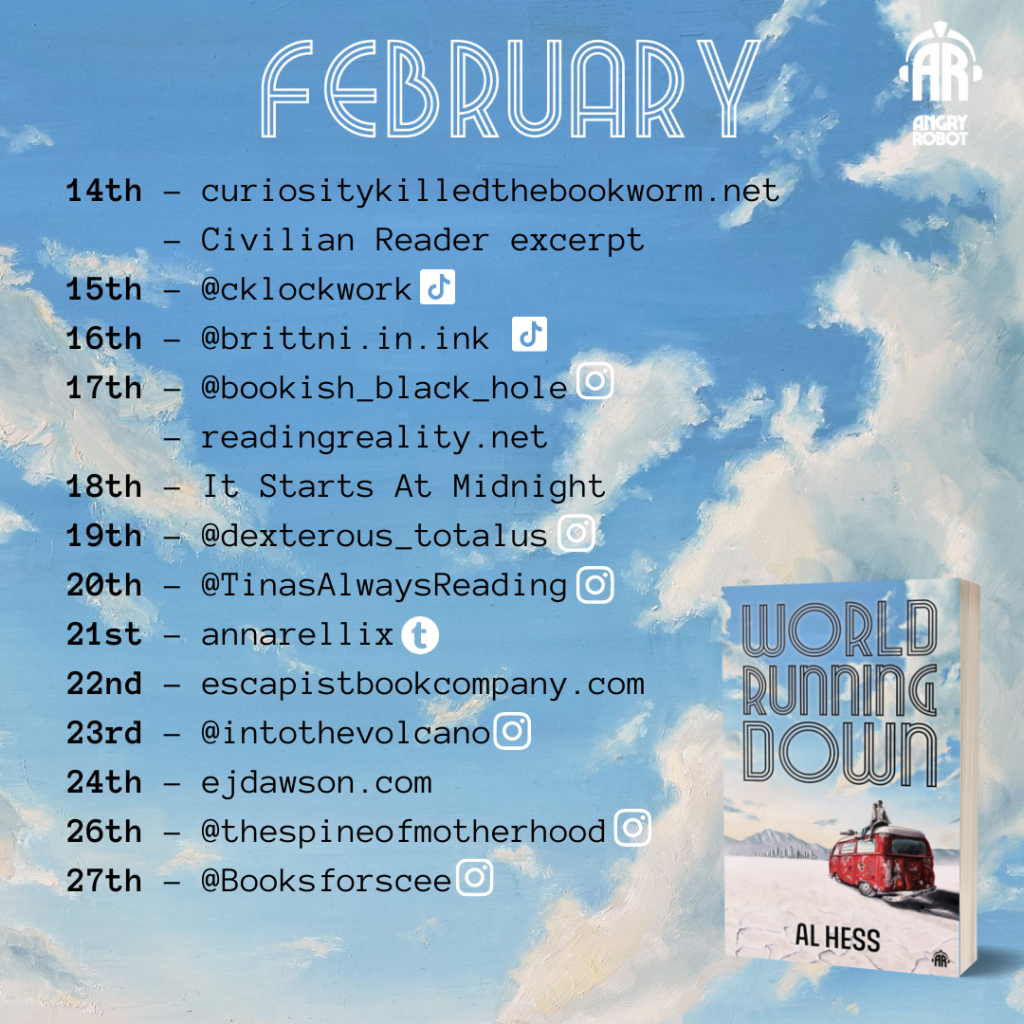 FEBRUARY
FEBRUARY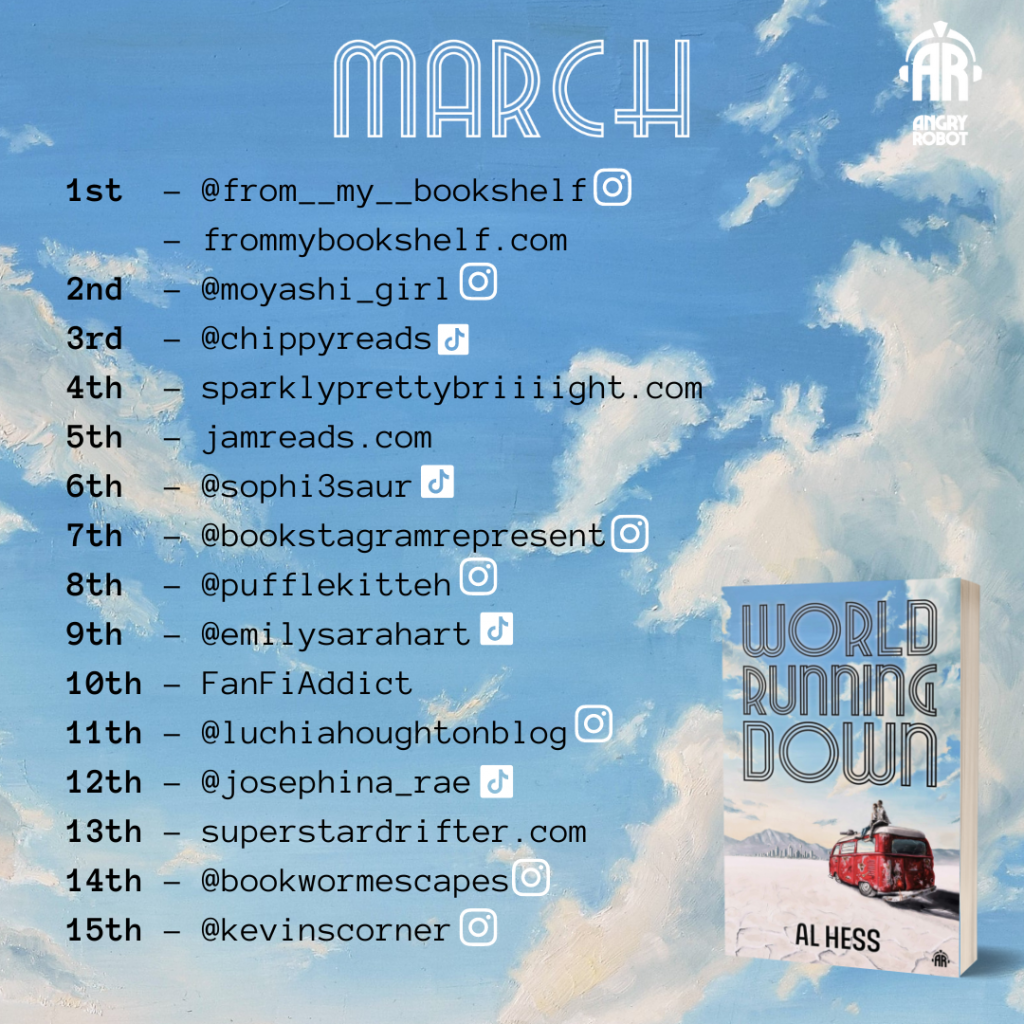 MARCH
MARCH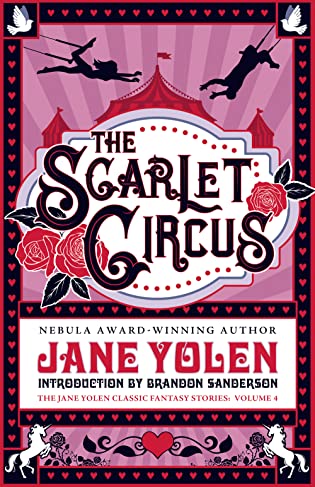 The Scarlet Circus by
The Scarlet Circus by 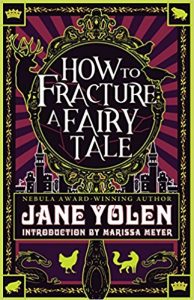 This ended up being my Valentine’s Day review because, to paraphrase the author’s forward just a bit, while the stories contained within are not “Romances” with a capital R, each story does contain a romantic element – even if that element is not the center of the story and seldom results in anything like a happy ever after.
This ended up being my Valentine’s Day review because, to paraphrase the author’s forward just a bit, while the stories contained within are not “Romances” with a capital R, each story does contain a romantic element – even if that element is not the center of the story and seldom results in anything like a happy ever after.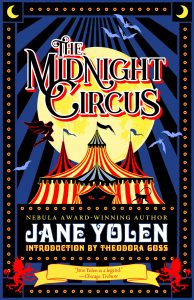 Those initial stories were interesting and fun but didn’t quite touch my heart – although “Dusty Loves” certainly tickled my funny bone a bit. These next ones, however, got a bit closer to the heart of the matter – or at least my heart.
Those initial stories were interesting and fun but didn’t quite touch my heart – although “Dusty Loves” certainly tickled my funny bone a bit. These next ones, however, got a bit closer to the heart of the matter – or at least my heart.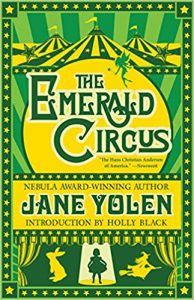 Escape Rating A-: Like most collections, the stories are a bit all over the map. I adored a couple, liked quite a few more, and a small number just missed the mark for me in one way or another – as the above descriptions show. But overall I’m very glad I picked this up, and enjoyed the ways that it played with romances of many types and stripes and definitions. That “love is all there is is all we know of love” doesn’t have to mean that all loves are exactly the same type.
Escape Rating A-: Like most collections, the stories are a bit all over the map. I adored a couple, liked quite a few more, and a small number just missed the mark for me in one way or another – as the above descriptions show. But overall I’m very glad I picked this up, and enjoyed the ways that it played with romances of many types and stripes and definitions. That “love is all there is is all we know of love” doesn’t have to mean that all loves are exactly the same type.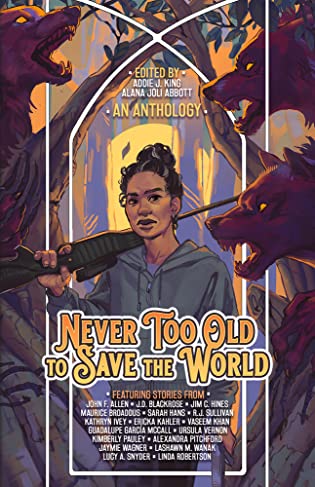 Never Too Old to Save the World: A Midlife Calling Anthology by
Never Too Old to Save the World: A Midlife Calling Anthology by 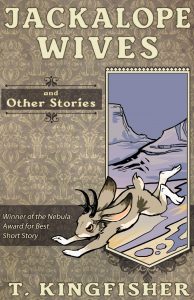 My favorite fantasy story is “Jackalope Wives” by Ursula Vernon – who also writes marvelously fantastic fantasy and horror as T. Kingfisher. “Jackalope Wives” is the only story in the book that has been previously published, originally in
My favorite fantasy story is “Jackalope Wives” by Ursula Vernon – who also writes marvelously fantastic fantasy and horror as T. Kingfisher. “Jackalope Wives” is the only story in the book that has been previously published, originally in  The Cliff's Edge (Bess Crawford #13) by
The Cliff's Edge (Bess Crawford #13) by 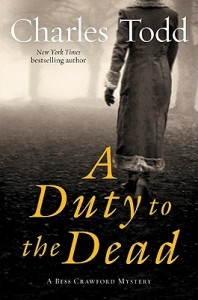 The cliff’s edge of the title is both literal and figurative in this 13th entry in the
The cliff’s edge of the title is both literal and figurative in this 13th entry in the 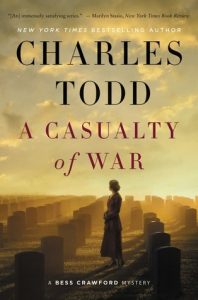 Escape Rating B-: As much as I have enjoyed this series, I believe that it is time for it to come to an end unless it makes a major change in direction. Because Bess has been in limbo for several entries now – at least since book 10,
Escape Rating B-: As much as I have enjoyed this series, I believe that it is time for it to come to an end unless it makes a major change in direction. Because Bess has been in limbo for several entries now – at least since book 10,  So Bess is in Yorkshire in the midst of this case, which is quite a muddle that doesn’t seem much clearer at its end. Not that the cause of the whole thing isn’t found, but rather that the solution isn’t terribly cathartic and doesn’t seem to resolve much of the surrounding tension.
So Bess is in Yorkshire in the midst of this case, which is quite a muddle that doesn’t seem much clearer at its end. Not that the cause of the whole thing isn’t found, but rather that the solution isn’t terribly cathartic and doesn’t seem to resolve much of the surrounding tension.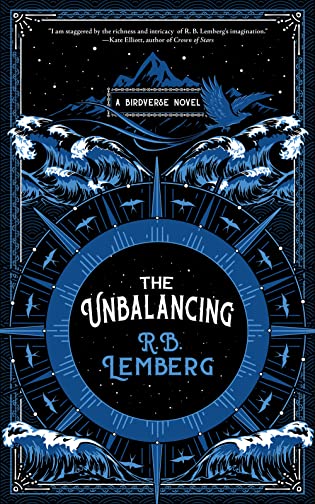 The Unbalancing by
The Unbalancing by 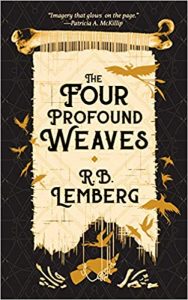 Escape Rating A: I enjoyed my introduction to the
Escape Rating A: I enjoyed my introduction to the 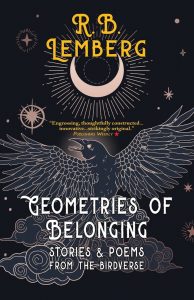 What gives this story its oomph – and lots of it – is the race to heal the star and save the islands. That the effort fails seems like it would be one hell of a downer – but it’s not. What makes the story rise in the end is the acknowledgement that the land, though beautiful, is not important. It’s the people that made the islands, and they’ll find a new place that they will make just as beautiful and fruitful, because they are bringing both the heart of Gelle-Gau and the heart of their beleaguered star along with them.
What gives this story its oomph – and lots of it – is the race to heal the star and save the islands. That the effort fails seems like it would be one hell of a downer – but it’s not. What makes the story rise in the end is the acknowledgement that the land, though beautiful, is not important. It’s the people that made the islands, and they’ll find a new place that they will make just as beautiful and fruitful, because they are bringing both the heart of Gelle-Gau and the heart of their beleaguered star along with them.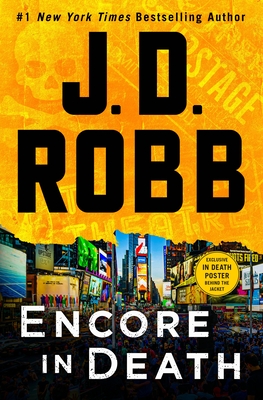 Encore in Death (In Death, #56) by
Encore in Death (In Death, #56) by 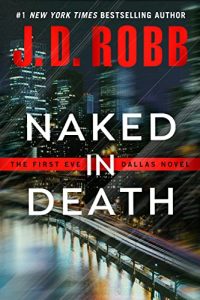 Figuring out what those ‘marriage rules’ are in her own marriage is a work in progress for Dallas. She expected to go through life alone – she certainly never expected to fall in love and get married to anyone, let alone to an ex-thief turned business mogul. All of which is pretty much the story of the entire
Figuring out what those ‘marriage rules’ are in her own marriage is a work in progress for Dallas. She expected to go through life alone – she certainly never expected to fall in love and get married to anyone, let alone to an ex-thief turned business mogul. All of which is pretty much the story of the entire 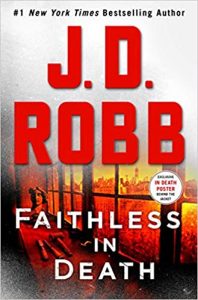 All things considered, however, this isn’t one of the great cases in Dallas’ career – not nearly as absorbing in itself as last year’s
All things considered, however, this isn’t one of the great cases in Dallas’ career – not nearly as absorbing in itself as last year’s 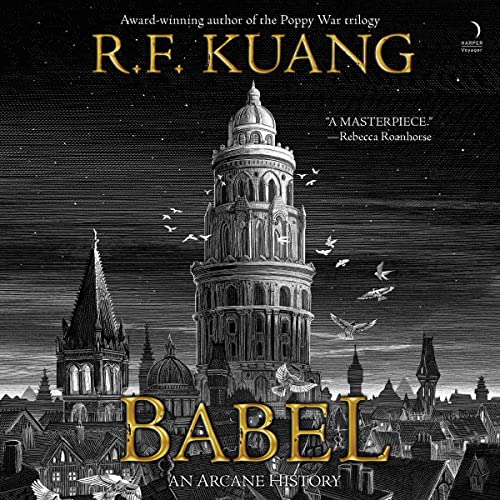 Babel, Or the Necessity of Violence: An Arcane History of the Oxford Translators' Revolution by
Babel, Or the Necessity of Violence: An Arcane History of the Oxford Translators' Revolution by 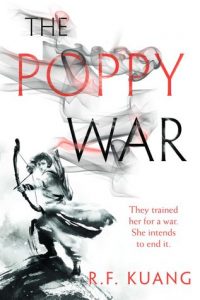 In a work of historical fantasy, particularly one that cleaved so close to this period, those evils would be impossible to ignore and no reader should expect them to be ignored. But Babel is fiction, which means I also went into it expecting a story to be told that would captivate me – and in this particular case captivate me every bit as much as the author’s
In a work of historical fantasy, particularly one that cleaved so close to this period, those evils would be impossible to ignore and no reader should expect them to be ignored. But Babel is fiction, which means I also went into it expecting a story to be told that would captivate me – and in this particular case captivate me every bit as much as the author’s 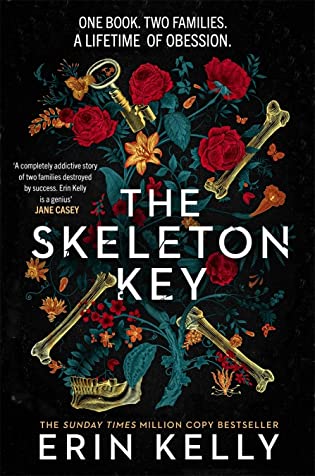 The Skeleton Key by
The Skeleton Key by 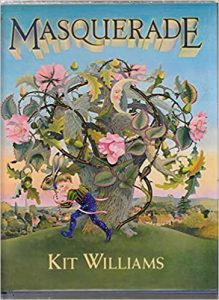 Two things to start. First, the concept of The Golden Bones may sound vaguely familiar – and that’s intentional on the part of the author and acknowledged at the beginning. There was a real, worldwide craze for armchair treasure hunt books in the 1980s, kicked off by the publication of the massively illustrated puzzle/story book
Two things to start. First, the concept of The Golden Bones may sound vaguely familiar – and that’s intentional on the part of the author and acknowledged at the beginning. There was a real, worldwide craze for armchair treasure hunt books in the 1980s, kicked off by the publication of the massively illustrated puzzle/story book